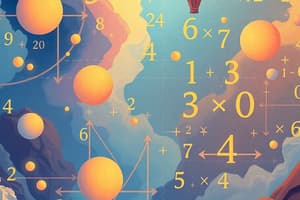Podcast
Questions and Answers
What is the set of numbers that includes all positive integers?
What is the set of numbers that includes all positive integers?
- Integers
- Rational Numbers
- Natural Numbers (correct)
- Whole Numbers
What operation is repeated addition of a number?
What operation is repeated addition of a number?
- Addition
- Multiplication (correct)
- Division
- Subtraction
What is the property where the order of numbers does not change the result?
What is the property where the order of numbers does not change the result?
- Inverse Property
- Associative Property
- Commutative Property (correct)
- Distributive Property
How many seconds are in an hour?
How many seconds are in an hour?
What is the unit of time that is equal to 60 minutes?
What is the unit of time that is equal to 60 minutes?
What is the distance around a shape called?
What is the distance around a shape called?
How many millimeters are in a kilometer?
How many millimeters are in a kilometer?
What is the unit of distance that is equal to 0.01 meters?
What is the unit of distance that is equal to 0.01 meters?
What is the term for regions with uniform standard time?
What is the term for regions with uniform standard time?
What is the term for morning and afternoon/evening?
What is the term for morning and afternoon/evening?
Flashcards are hidden until you start studying
Study Notes
Numbers
- Types of Numbers:
- Natural Numbers: 1, 2, 3, ... (counting numbers)
- Whole Numbers: 0, 1, 2, 3, ... (including zero)
- Integers: ..., -3, -2, -1, 0, 1, 2, 3, ... (including negative numbers)
- Rational Numbers: fractions, decimals, percentages (can be expressed as a ratio)
- Irrational Numbers: cannot be expressed as a ratio (e.g. π, e, sqrt(2))
- Number Operations:
- Addition: combining two or more numbers to get a total or a sum
- Subtraction: finding the difference between two numbers
- Multiplication: repeated addition of a number
- Division: sharing or grouping a number into equal parts
- Properties of Operations:
- Commutative Property: order of numbers does not change the result
- Associative Property: grouping numbers does not change the result
- Distributive Property: multiplying a number by a sum is the same as multiplying by each addend separately
Time
- Units of Time:
- Second (s)
- Minute (min) = 60 s
- Hour (h) = 60 min
- Day = 24 h
- Week = 7 days
- Month = 28-31 days
- Year = 12 months
- Time Conversions:
- 1 h = 60 min = 3600 s
- 1 day = 24 h = 1440 min = 86400 s
- Time-Related Concepts:
- AM/PM: morning (AM) and afternoon/evening (PM)
- Time zones: regions with uniform standard time
Distance
- Units of Distance:
- Meter (m)
- Kilometer (km) = 1000 m
- Centimeter (cm) = 0.01 m
- Millimeter (mm) = 0.001 m
- Distance Conversions:
- 1 km = 1000 m = 100,000 cm = 1,000,000 mm
- 1 m = 100 cm = 1000 mm
- Distance-Related Concepts:
- Perimeter: distance around a shape
- Circumference: distance around a circle
Numbers
- Natural Numbers are counting numbers, starting from 1, such as 1, 2, 3, ...
- Whole Numbers include zero, in addition to Natural Numbers, such as 0, 1, 2, 3, ...
- Integers include negative numbers, whole numbers, and zero, such as ..., -3, -2, -1, 0, 1, 2, 3, ...
- Rational Numbers can be expressed as a ratio, including fractions, decimals, and percentages
- Irrational Numbers cannot be expressed as a ratio, such as π, e, and sqrt(2)
- Addition is the process of combining two or more numbers to get a total or a sum
- Subtraction is the process of finding the difference between two numbers
- Multiplication is the repeated addition of a number
- Division is the process of sharing or grouping a number into equal parts
- The Commutative Property states that the order of numbers does not change the result
- The Associative Property states that grouping numbers does not change the result
- The Distributive Property states that multiplying a number by a sum is the same as multiplying by each addend separately
Time
- A Second (s) is a unit of time
- A Minute (min) is equal to 60 seconds
- An Hour (h) is equal to 60 minutes
- A Day is equal to 24 hours
- A Week is equal to 7 days
- A Month is equal to 28-31 days
- A Year is equal to 12 months
- 1 hour is equal to 60 minutes, which is equal to 3600 seconds
- 1 day is equal to 24 hours, which is equal to 1440 minutes, which is equal to 86400 seconds
- AM/PM refers to morning (AM) and afternoon/evening (PM)
- Time zones are regions with uniform standard time
Distance
- A Meter (m) is a unit of distance
- A Kilometer (km) is equal to 1000 meters
- A Centimeter (cm) is equal to 0.01 meters
- A Millimeter (mm) is equal to 0.001 meters
- 1 kilometer is equal to 1000 meters, which is equal to 100,000 centimeters, which is equal to 1,000,000 millimeters
- 1 meter is equal to 100 centimeters, which is equal to 1000 millimeters
- Perimeter refers to the distance around a shape
- Circumference refers to the distance around a circle
Studying That Suits You
Use AI to generate personalized quizzes and flashcards to suit your learning preferences.




